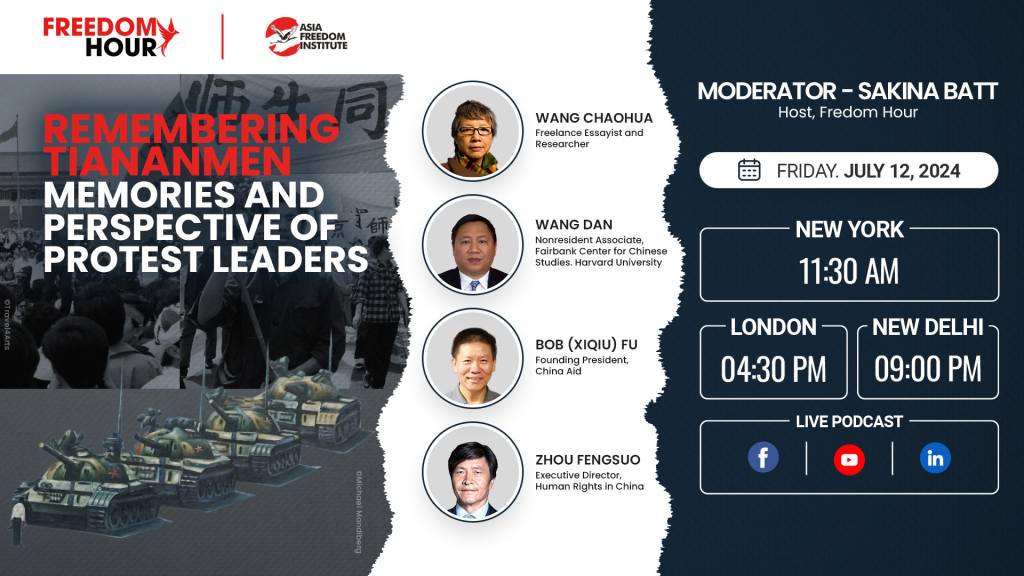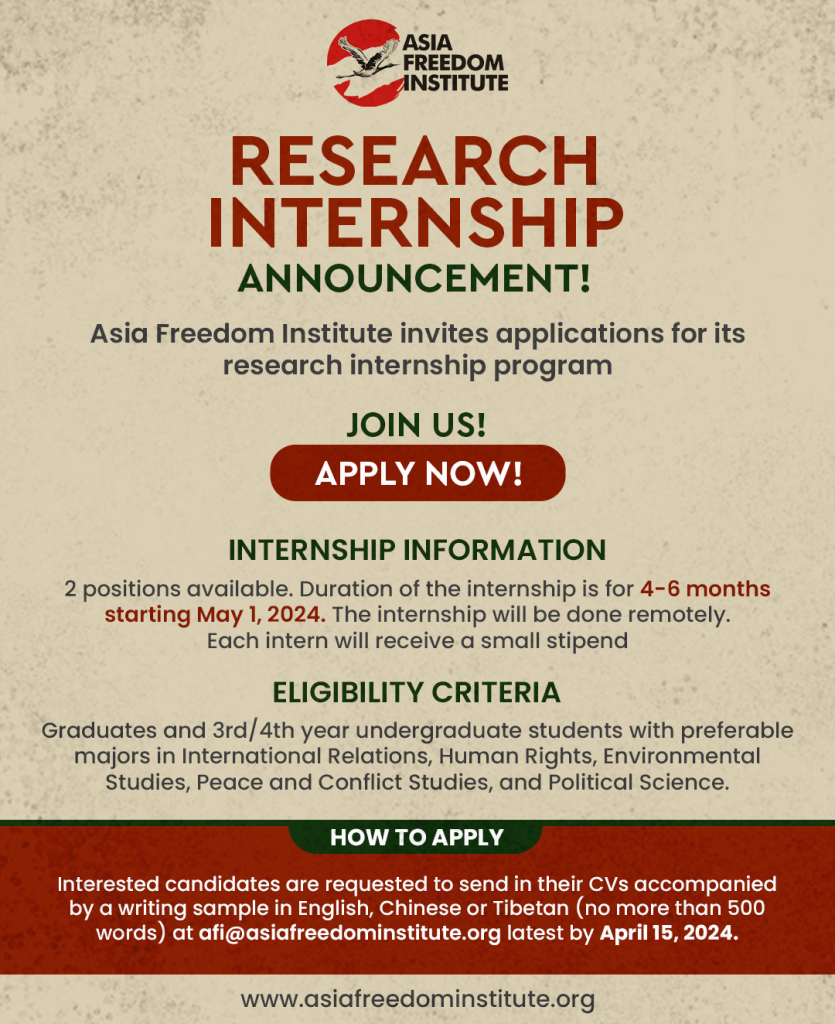35 years ago, the world witnessed one of the most pivotal moments in Chinese history. Hundreds of thousands of students and others marched to Tiananmen Square in Beijing and occupied the square for several weeks. The peaceful protest, which spread across China, demanded an end to official corruption and for political and economic reform. The Chinese government responded by sending armed troops, armored vehicles and tanks into the city center. The troops opened fire on the protestors on June 4, 1989. Thousands were killed. The government and the Chinese Communist Party (CCP) have sought to erase all reference and anything related to the Tiananmen Square protests and the massacre.
AFI’s Freedom Hour is honored to bring together four key former Tiananmen protest leaders and participants who were at the forefront of the historic events of 1989 which captured the world’s imagination and shook the Chinese government and the CCP to its core. The discussion will reflect on the events of 1989, personal experiences of the participants, the enduring impact of the protests on China and the world, the state of human rights and freedom in China today, and prospects of a more free and open China.
Date: July 12, 2024
Time: 11:30 am (New York). 04:30 pm (London). 9:00 pm (New Delhi)
Event Type: Live Video Podcast (YouTube, Facebook and LinkedIn)
Participants:
| Wang Chaohua Freelance essayist and researcher |
Wang Dan Nonresident Associate, Fairbank Center for Chinese Studies. Harvard University |
| Bob (Xiqiu) Fu Founding President, China Aid |
Zhou Fengsuo Executive Director, Human Rights in China |
Moderator:
Sakina Batt
Host, Freedom Hour, AFI
Streaming Links:
Facebook: https://www.facebook.com/AsiaFreedomInstitute/
YouTube: https://www.youtube.com/@AsiaFreedomInstitute/streams
LinkedIn: https://www.linkedin.com/company/asia-freedom-institute/
Biographies:
Chaohua Wang
Chaohua Wang is an independent scholar in modern Chinese history and literature. She studied civil engineering in college after spending five years in the countryside during China’s Cultural Revolution. The Reform Era provided her with the opportunity to pursue her interest in the humanities. She became an editor at a book-review journal in 1985 and then a graduate student majoring in modern Chinese literature.
The 1989 Tiananmen protest brought her to the center of the student movement. On 13 June 1989, the Beijing Public Security Bureau released an order for the arrest of 21 students they identified as the protest leaders. Chaohua Wang was one of the 21 names on the government’s most-wanted list. She spent more than six months in hiding before going to the U.S. in early 1990. While living in America as a political exile, she resumed her study at UCLA, earning her MA degree in modern Chinese literature in 1994 and Ph.D. degree in East Asian studies in 2008. She has been an avid observer of, commentator on, and participant in contemporary Chinese intellectual debates in the past two decades.
Wang Dan
Wang Dan was number one on China’s most-wanted list of Tiananmen Square protest leaders. He was imprisoned on July 2, 1989 and spent nearly two years in custody before being tried, in 1991, for “spreading counterrevolutionary propaganda and incitement” and was sentenced to four years in prison. He was released in 1993. He was arrested again in May 1995 for promoting democracy in China. He was held for 17 months before being charged with “plotting to overthrow the government” and sentenced to 11 years in prison. In 1998, Wang was released for “medical reasons” and sent to the United States.
Wang Dan obtained a PhD in history from Harvard University and taught modern Chinese history at National Tsing Hua University in Taiwan. He founded and heads the Dialogue China think tank in San Francisco, which studies alternatives for the governance of China. He is a Nonresident Associate at the New School for Democracy at the Fairbank Center for Chinese Studies at Harvard University.
Bob (Xiqiu) Fu
Bob (Xiqiu) Fu is one of the leading voices for persecuted faith communities in China. Fu was born and raised in mainland China and organized students to participate in the Tiananmen Square demonstrations for freedom and democracy in 1989. Fu graduated from the School of International Relations at the People’s (Renmin) University in Beijing and taught English to Communist Party officials at the Beijing Administrative College and Beijing Party School of the Chinese Communist Party from 1993-1996.
Fu was also a house church leader in Beijing until he and his wife, Heidi, were imprisoned for two months for “illegal evangelism” in 1996. Bob and Heidi fled to the United States as religious refugees in 1997 and subsequently founded ChinaAid in 2002 to bring international attention to China’s gross human rights violations and to promote religious freedom and rule of law in China. As president of ChinaAid, Fu has testified before the Congressional Tom Lantos Human Rights Commission, the House Foreign Affairs Committee, the U.S. Commission on International Religious Freedom (USCIRF), the Congressional-Executive Commission on China, the United Nations Commission on Human Rights (USCHR), the European Commission and European Union Parliament. He graduated with a Ph.D. from St. John’s College at the University of Durham in the U.K. in the field of religious freedom and from Westminster Theological Seminary in Philadelphia.
Zhou Fengsuo
Zhou Fengsuo serves as the Executive Director of Human Rights in China, a nongovernmental organization founded in March 1989 by overseas Chinese students and scientists. He is a Chinese human rights activist and former student leader during the Tiananmen Square protests of 1989. He was Number 5 on the 21 most wanted list of student leaders after the massacre in June 1989. After spending one year in prison, he was released in 1990 due to international support. He came to the United States in 1995. He received an M.B.A. from the University of Chicago Business School in 1998.
In September 2000, Mr. Zhou was the leading plaintiff in a lawsuit by Tiananmen Massacre victims against Li Peng for his Crimes against Humanity in 1989. He was President of the Chinese Democracy Education Foundation from 2007 to 2010. Mr. Zhou co-founded Humanitarian China in 2007. He is a frequent speaker on university campuses, including the Oxford Union. He has testified before U.S. legislative bodies, including the U.S. Congressional-Executive Commission on China (CECC).
Sakina Batt
Sakina Batt is a Producer and Director at Meeting Point, a leading audio-visual production house and buying agency in Nepal. She directs promotional videos, does voice overs, writes scripts and copywriting for the videos in Meeting Point. Sakina worked for Tibet TV at the Central Tibetan Administration in India for four years (2017-2021) where she served as a news presenter and an interview host. She also made short documentaries for the channel, wrote scripts, conducted research, edited videos and anchored the show In Conversation with Tibet TV. Sakina has a Masters in Mass Communication from Jamia Millia Islamia, New Delhi and a bachelors from Delhi University.


